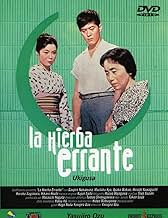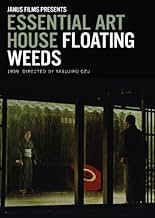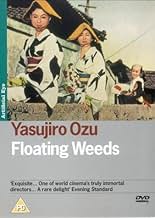IMDb RATING
7.9/10
9.5K
YOUR RATING
The head of a Japanese theatre troupe returns to a small coastal town where he left a son who thinks he is his uncle, and tries to make up for the lost time, but his current mistress grows j... Read allThe head of a Japanese theatre troupe returns to a small coastal town where he left a son who thinks he is his uncle, and tries to make up for the lost time, but his current mistress grows jealous.The head of a Japanese theatre troupe returns to a small coastal town where he left a son who thinks he is his uncle, and tries to make up for the lost time, but his current mistress grows jealous.
- Director
- Writers
- Stars
- Director
- Writers
- All cast & crew
- Production, box office & more at IMDbPro
Featured reviews
Floating Weeds by Yasujiro Ozu is an exquisitely restrained film about a failing acting troupe that travels to a small town and engenders a conflict of generations in a Japanese family. As the film opens a boat moves slowly into the harbor a Japanese coastal village. A Kabuki troupe arrives and begins to pass out leaflets announcing their opening performance. Sadly the opening crowds are small. Komajuro (Ganjiro Nakamura), the principal actor in the troupe, goes off by himself to visit Oyoshi (Haruko Sugimura), a former lover who runs a Saki bar. She has an adult son, Kiyoshi (Hiroshi Kawaguchi) who Komajuro had fathered many years ago. Komajuro has hidden his identity from the boy because of his shame at being a traveling actor and Kiyoshi only knows of him only as "uncle".
When Sumiko (Machiko Kyo), Komajuro's mistress and leading star, finds out about this relationship she goes into a jealous rage and hires a young actress, Kayo (Ayako Wakao) to seduce Kiyoshi in order to humiliate his father. Kiyoshi, however, falls in love with Kayo. Komajuro disapproves and shows his anger but cannot exert parental authority since he has not told his son the truth about his parentage. As the troupe continues to draw small crowds, Komajuro's inner pain becomes visible and he strikes out physically against Kayo, Sumiko, and Kiyoshi. It is only in the surprising conclusion that he seems to regain some sense of acceptance of his circumstances.
Floating Weeds is a very intimate experience. The camera does not move but remains focused on the characters as they engage in discussions about commonplace events. As in Bresson, the actors show little emotion and speak in a monotone with long silences between questions and answers. The overall effect, however, is not banality but a sense of the natural rhythm of life. Ozu is a loving observer of human nature not a moralist. There are no saints in this film and each character is vulnerable and deeply human. Komajuro has been stripped of his career, his relationship with his son, and his female companions who still beg him for forgiveness. He is alone but he has retained his humanity and we feel only compassion for him. The ending is, in the phrase of Donald Richie, "a kind of resigned sadness, a calm and knowing serenity which maintains despite the uncertainty of life and things of this world". Floating Weeds is a masterful film from a director who truly respects his audience.
When Sumiko (Machiko Kyo), Komajuro's mistress and leading star, finds out about this relationship she goes into a jealous rage and hires a young actress, Kayo (Ayako Wakao) to seduce Kiyoshi in order to humiliate his father. Kiyoshi, however, falls in love with Kayo. Komajuro disapproves and shows his anger but cannot exert parental authority since he has not told his son the truth about his parentage. As the troupe continues to draw small crowds, Komajuro's inner pain becomes visible and he strikes out physically against Kayo, Sumiko, and Kiyoshi. It is only in the surprising conclusion that he seems to regain some sense of acceptance of his circumstances.
Floating Weeds is a very intimate experience. The camera does not move but remains focused on the characters as they engage in discussions about commonplace events. As in Bresson, the actors show little emotion and speak in a monotone with long silences between questions and answers. The overall effect, however, is not banality but a sense of the natural rhythm of life. Ozu is a loving observer of human nature not a moralist. There are no saints in this film and each character is vulnerable and deeply human. Komajuro has been stripped of his career, his relationship with his son, and his female companions who still beg him for forgiveness. He is alone but he has retained his humanity and we feel only compassion for him. The ending is, in the phrase of Donald Richie, "a kind of resigned sadness, a calm and knowing serenity which maintains despite the uncertainty of life and things of this world". Floating Weeds is a masterful film from a director who truly respects his audience.
This, one of Ozu's last films, has all the elements of a Shakespearean tragedy played out among people living simple, workaday lives: deceit, jealousy, betrayal, vengeance, love, hope. It's all there. The acting by an all-star cast (at the time) of Japanese actors, including the gorgeous Ayako Wakao, is uniformly excellent. The cinematography may be the best I've seen for any color film made in the 1950's. The overall pace was a bit too slow for my liking, but it works well with a static camera taking every shot below eye level. This gives the viewer a visual perspective similar to looking at the actors on a slightly elevated stage, just as the audience does when watching the plays put on by the itinerant group of actors that centers the film. Overall, a well-crafted work by a recognized master, but not for the 'explosions & car chase' crowd. Rating: 8/10
I wrote this after I saw my first Ozu's film, "Tokyo Story" about a year ago: "As with every great work, the film has its own unique perfection in style, rhythm, details, and artist's vision - but Tokyo Story is very universal in its appeal, simply put, it is for every parent, every son or daughter - for everyone. It was made 50 years ago in Japan, about people who lived far away, but it is also about all of us, our families, our problems, our guilt and our search for love and meaning. Ozu's film does not require one to be a movie buff or to try to solve complex symbolism to appreciate and love it. It brings smiles because it is a comedy (for at least the first 2/3) and sadness with a high drama of the last 1/3 of the film."
I feel absolutely the same about "Floating Weeds". The film is quiet and deceptively simple but its simplicity reminded me the words of Michelangelo Buanorotti. When asked how he created the perfect statues from the shapeless marble lumps, he answered, "It is very simple, you just cut off all unnecessary pieces".
Ozu's films are perfect - they touch us with rare warmth, soft enveloping tenderness and power of human emotions not necessarily with striking visual or sound effects. "Floating Weeds" is a remake of earlier silent black and white Ozu's film "The Story of Floating Weeds". The story is simple: an aging, traveling actor who is the manager of a kabuki troupe returns to a remote village where he secretly meets his former lover and her 19 year old illegitimate son, to whom he is known as "uncle." The older man finds happiness in communicating with his son who turned to be a fine young man. His current mistress, filled with jealousy because of his attachment to his secret family, hires a young beautiful girl, the member of a troupe to seduce a boy. Something in this story attracted Ozu so much that he remade the film twenty five years later.
"Floating Weeds" is a beautiful color film and it is the first color Ozu's film for me. The colors are bright and fresh, tender and kind - they match the director's style perfectly. The delightful music by Kojun Saito reminds me of Nina Rota music in Fellini's films - nostalgic, innocent and rhythmic.
I feel absolutely the same about "Floating Weeds". The film is quiet and deceptively simple but its simplicity reminded me the words of Michelangelo Buanorotti. When asked how he created the perfect statues from the shapeless marble lumps, he answered, "It is very simple, you just cut off all unnecessary pieces".
Ozu's films are perfect - they touch us with rare warmth, soft enveloping tenderness and power of human emotions not necessarily with striking visual or sound effects. "Floating Weeds" is a remake of earlier silent black and white Ozu's film "The Story of Floating Weeds". The story is simple: an aging, traveling actor who is the manager of a kabuki troupe returns to a remote village where he secretly meets his former lover and her 19 year old illegitimate son, to whom he is known as "uncle." The older man finds happiness in communicating with his son who turned to be a fine young man. His current mistress, filled with jealousy because of his attachment to his secret family, hires a young beautiful girl, the member of a troupe to seduce a boy. Something in this story attracted Ozu so much that he remade the film twenty five years later.
"Floating Weeds" is a beautiful color film and it is the first color Ozu's film for me. The colors are bright and fresh, tender and kind - they match the director's style perfectly. The delightful music by Kojun Saito reminds me of Nina Rota music in Fellini's films - nostalgic, innocent and rhythmic.
... aren't we all, their lives steadily unravelling as their audience shrinks, their relationships stretched with secrets, revenge and deception coming to the fore. A poetic observation of life that turns the seemingly ordinary into something quite the opposite and, as relevant today as it has always been, as it encourages you to reflect on who you really are or have been, where you've come from and, more importantly, where you might be going.
"Floating Weeds" (Japanese, 1959): The first few things I notice about films by writer/director Ozu are: the incredibly consistent, artful composition used in his shots; his patience with the "ordinary"; and his intentional avoidance of "action" and blatant "drama". His films are meditative exercises on the daily truths we humans must face, which contain their own realistic challenges. Like Bergman and Allen, he too often uses the same actors, non-exotic locations, and stays within a philosophical area of interest that is obviously not market driven
which earns them dedicated followers...even after death. Ozu's films are pure elegance.
Did you know
- TriviaStated by cinematographer Kazuo Miyagawa about director Yasujirô Ozu: "I'll never forget that, from the first day on, he knew the names of everybody on the set, fifty people in the crew, people he'd never worked with. He'd written their names down, I learned later. But everyone was impressed and became devoted to him. Every single day working on this film was extremely pleasurable and enriching. In each of Ozu's films you can sniff his personality. He was pure, gentle, light-hearted, a fine individual."
- GoofsNear the end, sandals disappear or move around: after Kiyoshi argues with his father, he runs upstairs, first slipping out of his sandals and leaving them at the bottom (center) of the stairs. Moments later, Kayo goes up to him. We see that she, too, removes her sandals at the bottom of the stairs. But Kiyoshi's sandals have now suddenly disappeared: we see only Kayo's sandals at the bottom of the stairs. Moments later, Kiyoshi comes back downstairs to go after his father. He goes to put on his sandals, which have now suddenly reappeared, but in a different location from where he took them off. A moment later, Kayo also comes down the stairs and puts on her sandals, which are approximately where she had removed them and placed them, moments earlier.
- Quotes
Komajuro Arashi: You can't help an empty house, when it's empty.
- ConnectionsFeatured in Siskel & Ebert Holiday Gift Guide (1989)
- SoundtracksWasurecha iyayo (aka: Don't forget me)
Composed by Yoshikatsu Hoshoda
Sang by the play troupe on a ship
- How long is Floating Weeds?Powered by Alexa
Details
- Runtime1 hour 59 minutes
- Aspect ratio
- 1.37 : 1
Contribute to this page
Suggest an edit or add missing content



































